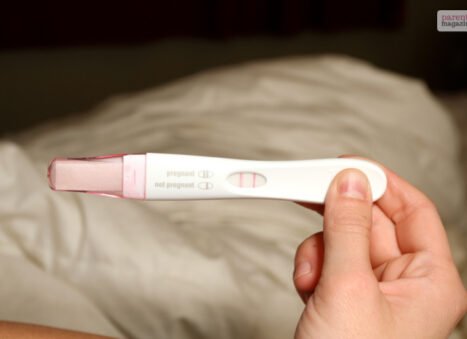
Which Food Can Cause Miscarriage? 26 Harmful Food To Avoid During Pregnancy
During pregnancy, every expectant parent typically dreams of a healthy and safe outcome. But in the middle of anticipation and joy, you cannot forget that there are food items that might pose a risk to pregnancy – it can be both mysterious and unsettling. We have all heard stories and rumors about certain foods causing miscarriage, leaving us with a blend of concern and curiosity.
But here is the thing: separating myth from the facts happens to be vital, especially when it is about the health of the mother as well as the baby inside them. Today, our primary concern is going to be – which food can cause miscarriage?
From exotic fruits and spicy dishes to normal kitchen ingredients, join us on our myth-busting journey, shedding light on what food, if any, should be avoided with caution during pregnancy. Stay tuned to find out more.
But First, What Does And Doesn’t Cause A Miscarriage?

Miscarriages are common. In fact, it is estimated, as per parents.com, that 26% of pregnancies actually end in a miscarriage, and this comes with the likelihood of increasing with time. While miscarriages are common, a whopping majority of people don’t know much about what specifically causes a miscarriage.
Most of the misinformation is passed down from the older generations or shared in hushed whispers among women. Most miscarriages are caused by reasons that are much beyond the control of the expectant person, such as underlying health conditions or even chromosomal abnormalities.
So, let’s check out what causes miscarriage – and what doesn’t!
Types Of Miscarriage

Well, who knew that miscarriage can also come in multiple types? These are the different types of miscarriages that your doctor can diagnose you with:
- Missed miscarriage – This happens when you lose the pregnancy and do not even know it. You are not aware of the present scenario. This is the case, there are no symptoms of miscarriage. It is diagnosed with the help of an ultrasound when it determines that there is no heartbeat present inside the womb.
- Complete miscarriage – This is when you have lost the baby and have experienced bleeding because of it. The fetal tissues have passed through, and your uterus is empty. Again, this can only be confirmed with the help of an ultrasound.
- Recurrent miscarriage – When you have lost three babies consecutively, then that condition is known as recurrent miscarriage. This happens to 1% of the couples.
- Threatened miscarriage – This happens when your cervix is closed, but you are still experiencing bleeding and pelvic cramps. But along with all of these threatening conditions, the pregnancy continues without any other issues. This requires close monitoring, and if there is any underlying issue, then that needs to be solved for the healthy growth of the baby.
- Inevitable miscarriage – This happens when you are cramping, bleeding, and the cervix has started to dilate. You might even leak your amniotic fluid. This is a condition where there is no chance of recovery, and a complete miscarriage is what is going to happen.
How Would You Know If You Are Having A Miscarriage?
It often happens that you are not aware that you are having a miscarriage. But the common signs that come with a miscarriage are:
- From light bleeding, it starts to change to heavy bleeding. You might even notice that you are passing blood clots and grayish tissues.
- You might also experience abdominal pain and cramps, which could be worse than your menstrual cramps.
- Lower back pain that might grow from mild to severe.
- You might stop noticing your pregnancy symptoms.
It is important that you should consult your doctor or healthcare provider if you start noticing any of these symptoms. They would know what course to take next and how to save the baby if there is still time.
Most Common Causes Of Miscarriages:
The most common causes of miscarriages are as follows,
- Chromosomal abnormalities in the fetus.
- Genetic factors,
- Underlying health conditions of the expectant woman,
- Hormonal disorders,
- Drug as well as alcohol use,
- Uterine abnormalities,
- Infections, and
- Cervical abnormalities.
What Doesn’t Cause Miscarriage?
While we are aware of the things that can increase or cause the risk of a miscarriage, there are several myths that surround miscarriage. It is vital to understand that miscarriage myths are like the tales of old wives. Not only are these myths absolutely false, but in certain cases, believing otherwise can have a negative impact on your health.
So, we decided to debunk some of the major myths of miscarriage – scroll down to find out!
1. Moderate Exercise:
Exercising or even picking up reasonably heavy objects such as a toddler or a grocery bag are very unlikely to cause a miscarriage. Exercising moderately during your pregnancy has multiple benefits, according to experts.
2. Everyday Stress:
Yes, it is not healthy to stress over every other thing that happens in your life. But stressing over work or even getting anxious about labor has no proven link to pregnancy. Plus, no studies have ever linked excessive bad moods to miscarriage.
3. Sex:
Sex and all related acts, including the use of sex toy, is considered to be absolutely safe in case of low-risk pregnancies. Your fetus is actually protected by amniotic fluid and powerful muscles of your uterine walls.
Which Food Can Cause Miscarriage? 26 Harmful Food To Avoid During Pregnancy

So, Which food can cause miscarriage? Without wasting time beating around the bush, scroll down to find out the foods that cause miscarriage when you are expecting!
1. Animal Liver:
Although animal liver is considered to be highly nutritious, it is not safe for any pregnant woman. Eating it regularly during your pregnancy can cause retinol to build up, causing harm to your unborn child. However, eating it occasionally is not harmful.
2. Papaya:

Can papaya cause miscarriage in early pregnancy? Green or unripe papaya contains multiple enzymes as well as pus, both of which lead to uterine contraction, which in turn causes miscarriage.
Because of enzymes, the uterus actually ends up developing spasms, which ends in miscarriage. Hence, it is best to avoid papayas, especially during the early days of your pregnancy.
3. Aloe Vera:

Aloe Vera is one of the foods that cause miscarriage. If you are expecting, then you should definitely avoid consuming aloe vera juice since it can cause pelvic hemorrhage. This leads to uterine bleeding, which in turn causes miscarriage. It includes a laxative known as anthraquinones, which causes uterine contractions.
4. Pineapple:

Consuming pineapple juice or pineapples during your pregnancy’s first trimester can cause stillbirth. Pineapple contains Bromelain, which leads to a type of contraction in expectant women, causing miscarriage.
5. Sprouted Potatoes:

If you have been asking Google, ‘Which food can cause miscarriage,’ then sprouted potatoes definitely make it to the list. Sprouted potatoes contain solanine, which can be very harmful to the growth of the fetus.
6. Caffeine:

Caffeine consumption in average quantities during pregnancy is not really harmful. Studies actually show that an increase in levels of caffeine consumption in expectant ladies might actually increase the risk of miscarriage or ending up with an underweight baby.
7. Mercury-Rich fish:

Women should be just a little more careful than necessary during their first trimester with the consumption of fish. There are multiple varieties of fish, such as swordfish, king mackerel, marlin, or tuna, that contain high levels of mercury.
It has an impact on the development of the baby’s nervous system and brain, increasing the risk of having a mentally unstable or immature baby. It is definitely one of the things to avoid during pregnancy that causes miscarriage!
8. Undercooked Or Raw Fish:
Are you a Sushi lover? We understand! But the thing is, shellfish can cause multiple infections like viral, parasitic, or bacterial infections. Studie shows that an expectant woman is more likely to get listeria infections – this, in turn, can pass through your baby’s placenta, causing miscarriage.
9. Raw Or Processed Meat:
Raw or processed meat contains bacteria such as salmonella, E. coli, and listeria. All these happen to be life-threatening bacteria for your unborn child. It might also lead to serious neurological disorders, blindness, epilepsy, and stillbirth.
10. Raw Eggs:
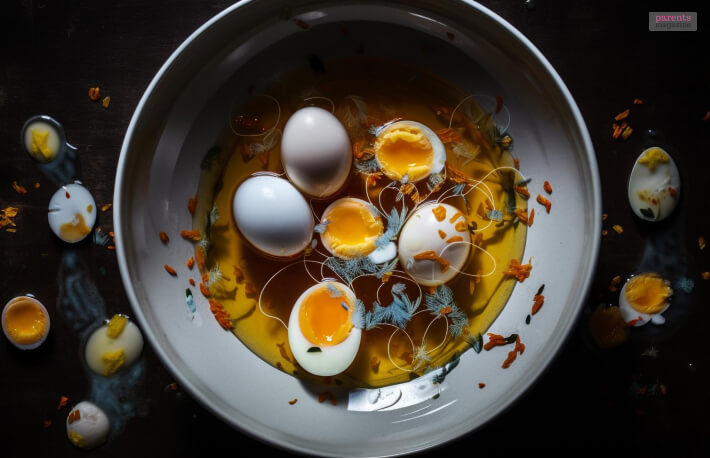
Raw eggs include salmonella, causing multiple harmful infections. The symptoms include stomach cramps, nausea, fever, vomiting, and diarrhea. Hence, avoiding foods containing raw eggs can definitely cause miscarriage. It also includes lightly scrambled eggs, poached eggs, homemade cake icings, and homemade mayonnaise.
11. Raw Sprouts:
If you have been wondering which food can cause miscarriage, then you must avoid raw sprouts. Raw sprouts such as clover, radish, alfalfa, and mung bean sprouts often end up getting contaminated with Salmonella.
Plus, the seeds of these particular veggies need a humid environment ideally, which is perfect for Salmonella bacteria’s growth, causing much harm to the fetus.
12. Unpasteurized Dairy Products:
Unpasteurized dairy products contain dangerous bacteria such as listeria and salmonella. On multiple occasions, these daily products end up causing life-threatening problems to an unborn baby, such as neurological disorders. Plus, it can also lead to an untimely miscarriage.
13. Alcohol:

During your early pregnancy day, avoiding alcohol consumption is vital. During your pregnancy, if you consume alcohol, it will cause fetal alcohol syndrome, which in turn can lead to heart defects, intellectual disability, and facial deformities. Additionally, it can also cause stillbirth or miscarriage.
14. Drumstick:
Expectant women must take certain precautions while consuming drumsticks. This is because drumsticks include alpha-sitosterol, which is considered to be detrimental for expectant women. Hence, you need to eat in limited quantities or just avoid the same altogether during early pregnancy.
15. Crabs:
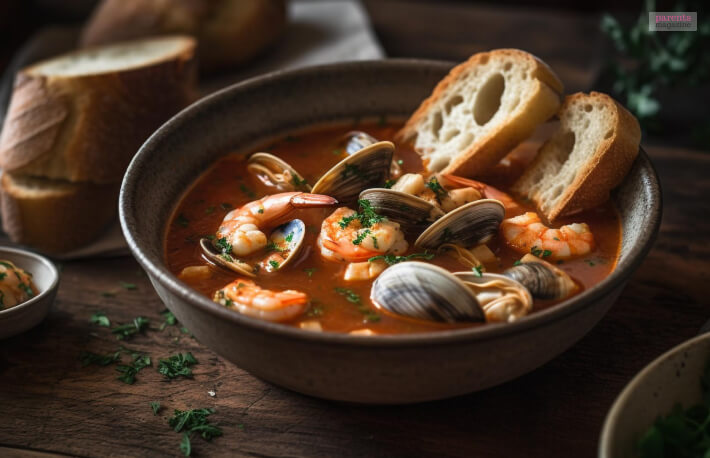
Although crabs are packed with crucial nutrients, you should avoid eating any crabs in high quantities during the early stages of pregnancy. It actually causes the uterus to shrink, which in turn leads to internal bleeding and eventually stillbirth. Plus, its levels of cholesterol influence the overall health of pregnant women.
16. Herbs:
Multiple experts do not usually recommend consuming herbs since these contain multiple steroids that impact the growth of the fetus. For example, the Dong Quai herb includes enzymes that are known for initiating miscarriage or even causing premature delivery.
17. Wild Apples:
One food that cause abortion is wild apples. These wild apples have acidic and sour properties that can induce uterus contraction, often leading to a premature delivery or a miscarriage.
18. Spices:
Spices are primary ingredients that are known for adding aroma and, most importantly, flavor to any food. However, avoiding certain spices during pregnancy, such as fenugreek, asafoetida, angelica, and garlic, is important for your baby’s health since these spices stimulate the expectant mother’s uterus, which causes contractions and blood thinning.
19. Junk Food:
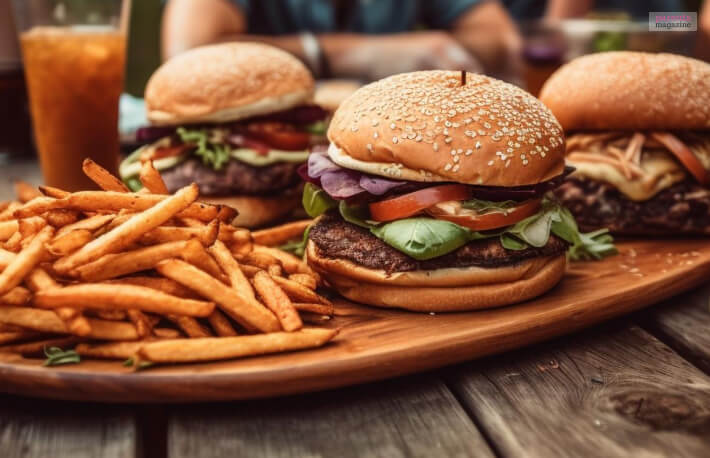
Junk food doesn’t really provide any healthy nutrients and happens to be high in fats, sugars, and calories. Plus, consuming a high dosage of sugar during pregnancy can cause weight gain, heart ailments, and gestational diabetes.
20. Smoked Seafood:
One should simply avoid smoked or refrigerated seafood, especially the ones labeled as nova or lox. It includes listeria, which can cause infections, further leading to miscarriage.
21. Sesame Seeds:
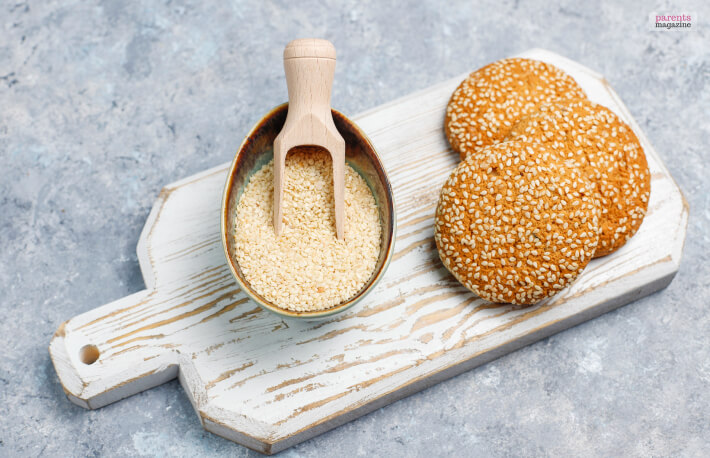
Which food can cause miscarriage? Unfortunately, not one but multiple food items can cause miscarriage, such as sesame seeds for example. Consumption of sesame seeds accompanied by honey is considered to be absolutely dangerous for expectant women. It heats your body up, which leads to uterine contraction.
Interestingly, consumption of these seeds during the end of your pregnancy can help if you are opting for natural delivery.
22. Unwashed Vegetables And Fruits:
Unwashed vegetables and fruits contain harmful bacteria. It can cause multiple bacterial infections, making life difficult for you and your unborn baby.
Read Also: What is Morphology Scan?
23. Herbal Tea:

Yes, there are certain types of herbal tea that include steroids, which are considered to be harmful during pregnancy. If you still want to have herbal tea, then you must seek the recommendation of a doctor.
24. Pre-Packaged Salads:
Pre-packaged salads contain listeria contamination, which in turn poses a very serious impact on the health of the baby.
25. Energy Drinks:
Energy drinks have a high percentage of caffeine. As a result, it is one of the crucial foot items that can lead to an unwanted abortion when consumed in large amounts.
26. Peach:

Expectant women must avoid peaches or consume them in moderation. This is because peaches increase the risk of bleeding. This is a really delicious fruit that has a hairy shell, which can be very hazardous. It is also possible to suffer from severe repercussions like miscarriage simply as a result of the itchy and burning sensation in the throat.
Foods That Cause Miscarriage In The Second Trimester:
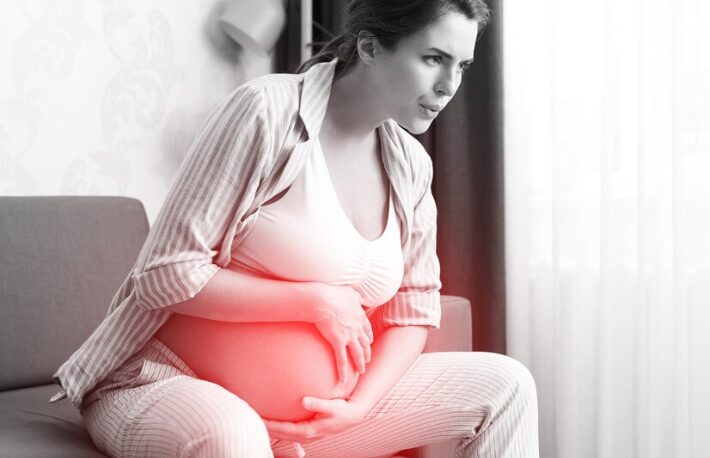
In a pregnant woman’s second trimester, an expectant woman should definitely continue to have a blanched diet nutritionally rich in Vitamin D, Calcium, Protein, Folate, and Iron.
However, here are the foods that cause miscarriage in second trimester!
- Raw meat, fish, and eggs.
- Ready-to-eat meat and seafood.
- Soft cheese such as feta and blue cheese.
- Unpasteurized dairy products.
Foods That Make Your Pregnancy Healthy
While certain foods carry the possibility of a miscarriage, some are your best friends during pregnancy. Pregnancy calls for an addition of extra calcium, protein, iron, and essential vitamins to your diet. There are food options that are actually beneficial and promote a healthy pregnancy.
Here is a detailed list of all the products that you may eat comfortably during pregnancy without any worries.
Dairy Products
While pregnant, you will need all the extra protein and calcium to meet the needs of your baby. Dairy products such as cheese, milk, and yogurt are particularly good choices when it comes to dairy choices.
They have two types of high-quality protein: whey and casein. Dairy is one of the best dietary sources of calcium. It is also rich in B vitamins, phosphorus, zinc, and magnesium.
Yogurt, particularly Greek yogurt, may be more beneficial than others. Some varieties are also rich in probiotic bacteria that support digestive health.
Legumes
Legumes mainly include peas, lentils, beans, soybeans, chickpeas, and peanuts. These are brilliant sources of plant-based protein, fiber, folate, iron, and calcium – all of which are desperate during pregnancy.
Folate is one of the most essential B vitamins. It is especially important for the baby and the mother, particularly during the first trimester and even before that.
Sweet Potatoes
Sweet potatoes are particularly rich in beta-carotene, a plant-based compound that the body converts to vitamin A.
Vitamin A is important for the development of the baby. However, an excessive quantity of vitamin A from animal-based sources, like organ meat, may turn out to be toxic.
Sweet potatoes are healthy plant-based sources of beta-carotene and fiber. Fiber helps keep the stomach full for the longest time, reduces spikes in blood sugar levels, and improves digestive health. This reduces the risk of constipation caused by pregnancy.
Salmon
If you already did not know, salmon is there on the list of foods that you can easily have during pregnancy. Salmon is a rich source of omega-3 fatty acids, which have a line of benefits.
Omega-3 is present highly in seafood. They help develop the eyes and brain of the baby and increase their gestational length.
While it is best to stay away from certain seafood during pregnancy because of their mercury content, salmon, anchovies, and sardines are safer options that treat your tastebuds, too.
Eggs
Eggs are one of the healthiest foods to have as they literally have every possible nutrient you need. A big egg contains around 71 calories and 3.6 grams of protein, along with fats and other vitamins and minerals.
Eggs are also great sources of choline, a vital nutrient during pregnancy. It is necessary for the development of the baby’s brain and to prevent any abnormalities of the spine and the brain.
Broccoli And Leafy, Dark Greens
Broccoli, along with other dark, leafy veggies like spinach and kale, have most of the nutrients that you will need during pregnancy. If you do not like the flavors, you may disguise them by using them in pasta sauces, soups, and more.
They have vitamin C, fiber, vitamin A, vitamin K, iron, calcium, folate, and potassium. The high fiber content also keeps away pregnancy constipation.
Other Things To Avoid During Pregnancy
Now that you know which food can cause miscarriage, let’s check out some other things that you must avoid during pregnancy!
1. Acupuncture And Massage:
Avoid pressing points or massaging that connect to the abdomen and end up impacting the baby. Typically, one should simply avoid massaging in the initial months of pregnancy.
2. Painting:
Modern painting products come with a very high risk of lead and fumes. Maintain distance from renovating your house as you might get exposed to lead, which, in turn, can hamster the brain development of your fetus.
3. X-Rays:
The radiation that comes from X-rays causes mental and physical defects in your baby. Hence, consider other techniques of scanning, such as ultrasound, so that the harmful radiations do not end up reaching the baby.
It’s not the Food Always: Miscarriage & Obesity
The chances of miscarriage can increase with obesity. Someone with a BMI over 30, there’s a high chance of developing the risk of pregnancy. It’s best to check out your BMI with a BMI calculator. When you’re pregnant, you can ask your midwife or the doctor to help you know your BMI.
It’s best to be aware of the risks before you become pregnant. So, if you are obese, it’s best to consult with your doctor first. Discuss with them how you can adjust your BMI and bring your weight down to a level where you don’t develop a risk of miscarriage.
Your GP can also help you refer to a special clinic for weight loss before conceiving. However, there’s no proof saying that you can lower your chances of miscarriage by reducing your weight during pregnancy.
But, you can avoid the food we have mentioned here and build a habit of eating healthy food. Activities like walking and swimming are healthy enough. Overall, a healthy lifestyle is important for a healthy pregnancy.
Also, if you haven’t been active before your pregnancy, it’s best to consult your doctor and your midwife about them. They can help you kickstart on a healthy pregnancy dietary and exercise routine.
And It’s A Wrap!
Now you know which food can cause miscarriage – you are also aware of what primarily causes miscarriages and what primarily doesn’t! So, what are your thoughts? If you are an expectant mother or planning to become one soon, then we are hoping that this blog proves to be of help! Feel free to share your thoughts, experiences, and opinions on the same in the comments below.
Additional Reading:
Already have an account?
Sign In
Create your account
User added successfully. Log in









